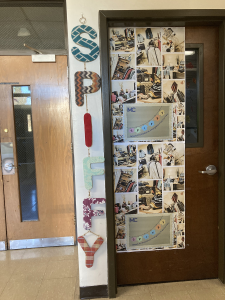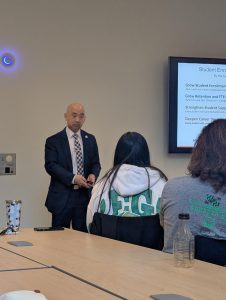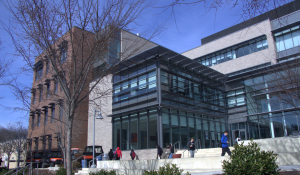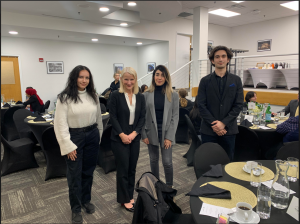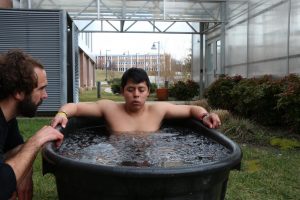Montgomery College’s New President Talks with The Advocate
May 22, 2022
Listen to this Q+A on the Advocate Podcast: https://mcadvocate.com/the-mc-advocate-podcast/
Introduction
Welcome to the MC Advocate podcast. My name is Nida Khan, your Podcast Editor, and I am so excited to bring you this episode because today, we will be in conversation with MC’s new President, Dr. Jermaine Williams.
Before we get started, I wanted to share an anecdote I heard from my Achieving the Promise Academy coach. When she was lost trying to find the community town halls, Dr. Williams noticed her and was able to direct her to the right location. It was significant for her because, despite the crowd of people around Dr. Williams, who each had something different for him to do, he took time out to notice when someone needed his help.
Q + A
Nida Khan:
What is your leadership philosophy in two to three sentences?
Dr. Jermaine Williams:
A big component of my leadership philosophy is emotional intelligence. There are several components of emotional intelligence. One of those is knowing how you’re impacting others and being inclusive of those around you. So, when I see people, I’m wondering “what are they going through? What is their perspective? Is there something I can glean from?” And I think that’s wrapped around trying to be a servant leader.
My philosophical approach to being a leader is also identifying how we can identify even a challenge and understand how to become stronger in response to it. Those are two of the biggest components of my leadership. Inclusion and really being able to listen to individuals to get their perspectives because I think for us to be able to lead, we must understand our constituents.
Nida Khan:
How do you address hurdles and face adversity as a leader?
Dr. Jermaine Williams:
I’m doing a lot of listening and a lot of learning because I want to be able to help our community identify what our strengths are. When we talk about our challenges and hurdles, we need to increase the impact of the successes that we already have and identify new opportunities. In terms of facing adversity, it’s all about communication, compassion, and collaboration, right? Keeping goals at the center of conversations provides an opportunity to align expectations and ensure focus.
Nida Khan:
I agree, I think adversity shouldn’t be seen immediately as a bad thing, but just as a neutral experience that you can change into a good thing. It reminds me a lot of Resiliency 2.0 and antifragility, which is growing from adversity rather than returning to baseline.
One challenge for community colleges in the drop in enrollment after the first wave of COVID-19. What would you say to students who are grappling with whether or not to enroll in college?
Dr. Jermaine Williams
I realized long ago that I could sit down and talk about all the programs and resources we have at a community college, but if it does not relate to their needs, I’m not making a connection. For me, addressing lower enrollment means going to even greater lengths in meeting student needs and wants. What’s going to help them gravitate? What places and spaces do we need to be in? Physically or virtually, or even psychologically. How can we align that with an educational experience at? Here at Montgomery College, we have credit/non-credit, certificates, badges, micro-credentials, associates, so we are always trying to understand what would help students the most and how to provide that.
Nida Khan:
Why should students be proud of being community college students?
Dr. Jermaine Williams:
I am proud of being a Raptor. The warmth that I’ve experienced as I am transitioning has been absolutely amazing. The level of care and support I see from our faculty and staff who are supporting our students is something to take pride in. They care about helping you identify and achieve your goals.
I am also proud to be a Raptor because I’ve met with a lot of our students and the passion that they have for changing the world, addressing social justice issues, and helping our local community and global communities is fantastic.
Community colleges are also a fantastic opportunity. The reason they were invented was to provide high-level academic opportunities at an affordable cost and in close proximity to where you are. The basic premise of the community college is to meet a societal need for an educated citizenry. So, when you come to a community college, you’re a part of this larger historical context that was created to uplift, engage, and enhance an educated citizenry. It is also at an affordable cost and it will lead to a family sustainable wage and social mobility.
Conclusion
Nida Khan:
I hope you enjoyed this episode. I know that my conversation with Dr. Williams gave me a lot to think about, and as a graduating student, the idea of community college pride really hit home. I know that MC means a lot of different things for a lot of different people, but for me, it was a place that accepted me when few others would have and gave me the tools to grow invariably. So, I’m grateful to be a part of this history. And I hope that you also see the beauty of being a community college student.



